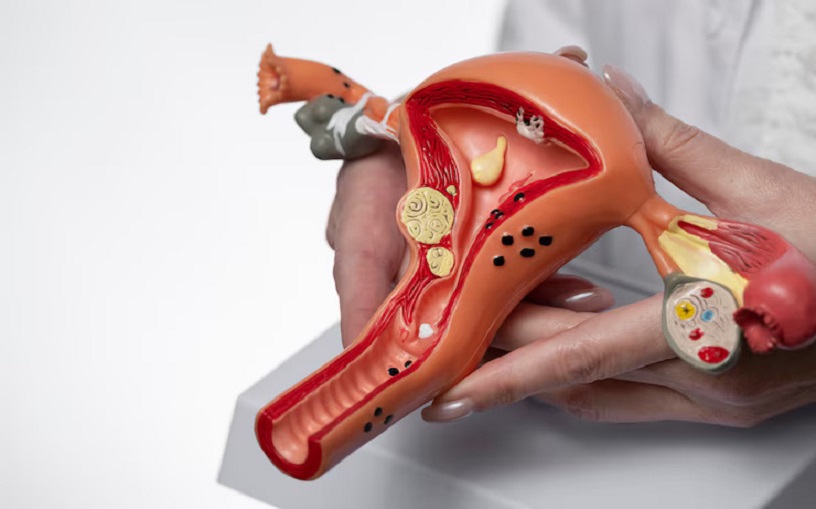 Jul 18, 2024
Jul 18, 2024
Endometriosis is a chronic condition which is so painful for women worldwide. It has also affected the life of women worldwide. Despite generally, It remains underdiagnosed and misunderstood. This blog aims to shed light on what endometriosis is, and what the symptoms are. And the available treatment options.
Vijay Nursing Home is a multispeciality Hospital in Rohini Delhi. In this hospital you will get the best gynecologist. There you will get the best diagnosis and treatment for every type of disease. This Hospital has been recognized as the best gynaecologist rohini. In the next paragraphs you will get to know about the Symptoms, diagnosis and treatment of endometriosis.
What is Endometriosis (Get familiar with the Word):
The growth of tissue that is similar to the lining inside the uterus, known as the endometrium, outside the uterus is what causes endometriosis. Endometrial implants are a term commonly used to describe these growths, which can be located on the ovaries, fallopian tubes, the outer surface of the uterus, and other organs within the pelvis. The tissue that was misplaced persists in its normal functions -- thickening, breaking down, and bleeding during each menstrual cycle. The trapped situation causes inflammation, pain, and scar tissue due to its inability to exit the body.
The symptoms of endometriosis are as follows:
The severity and type of symptoms can vary widely between women with endometriosis, but some of the most common ones include:
Pelvic pain: It is commonly linked to menstrual periods, but it can occur at other times as well.
Menstrual irregularities: It can be manifested by heavy periods or bleeding between periods (menorrhagia).
Pain During Intercourse: Sex pain is common in women with endometriosis.
Pain in the bowel movements and Urination: Particularly during menstrual periods.
Infertility: Endometriosis may be the first diagnosis for those seeking treatment for infertility.
Other symptoms: include fatigue, diarrhea, constipation, bloating, and nausea, especially during menstrual periods.
Aspects of Causes and Risk Factors:
The cause of endometriosis is a mystery, but there are several theories that exist, such as:
Retrograde menstruation: It occurs when menstrual blood flows backward through the fallopian tubes into the pelvic cavity instead of leaving the body.
Embryonic Cell Transformation: Endometrial-like cell implants are formed during puberty when hormones such as estrogen transform embryonic cells.
Surgical Scars: The surgical scars may be formed by endometrial cells after a surgery, such as a hysterectomy or C-section.
The risk of developing endometriosis is elevated by several factors, such as:
Never Giving Birth: Women who have never given birth are at higher risk.
Menstrual History: Starting periods at an early age, going through menopause at an older age, short menstrual cycles, heavy menstrual periods that last more than seven days, and high levels of estrogen.
Family History: Having relatives with endometriosis.
Medical Condition: Menstrual flow that is prevented from passing out of the body due to medical conditions.
Establishing diagnosis for endometriosis:
Endometriosis can be a challenging diagnosis because its symptoms mimic those of other conditions. Here are some common steps in the diagnostic process:
Medical history and pelvic exam: It can provide clues with a detailed history and pelvic exam.
Imagine Tests: Cysts associated with endometriosis can be identified by imaging tests such as ultrasound, MRI, or CT scans.
Laparoscopy: It is a surgical procedure that uses a camera to look for endometrial tissue in the pelvic cavity.
Options for treating endometriosis:
Although endometriosis cannot be cured, there are multiple treatment options that can assist in managing symptoms and improving quality of life. Treatment options include:
Medications: Pain reduction and symptom management can be achieved through medications, such as pain relievers, hormonal therapies, and other medications.
Conservative Surgery: For women wanting to become pregnant, conservative surgery is carried out to remove as much endometriosis as possible while preserving the uterus and preventing its formation.
Fertility Treatment: Fertility treatments may be beneficial for women with endometriosis who are having difficulty becoming pregnant Such as in IVF.
Hysterectomy: In extreme cases, a total hysterectomy (removing the uterus and cervix) and occasionally the ovaries may be consulted.
The experience of living with Endometriosis:
Managing endometriosis is a lifelong journey. Support from healthcare providers, family, and friends is crucial. In addition, joining support groups and seeking counseling can offer emotional relief and practical advice. Maintaining open communication with your healthcare team and staying informed about the condition are essential steps in managing and living well with endometriosis.